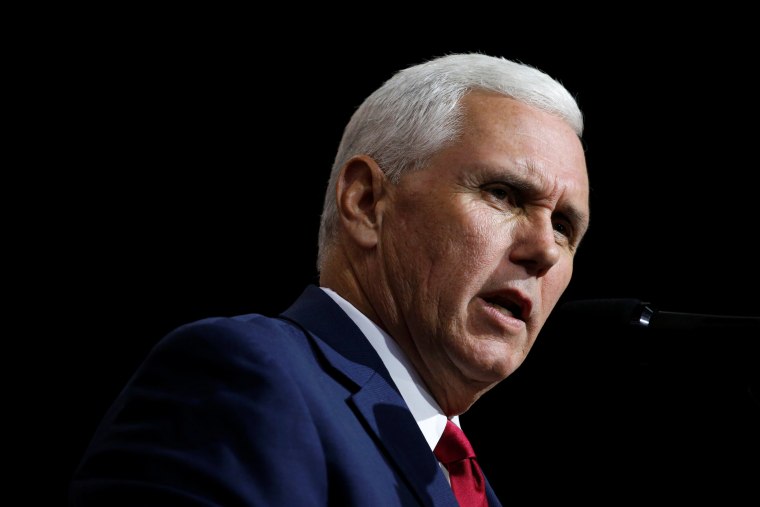Vice President Mike Pence was in Germany over the weekend, speaking at the Munich Security Conference, one of the Western world's leading gatherings for international affairs. The Indiana Republican began his remarks by telling attendees that he was there on behalf of a "champion of freedom and of a strong national defense."
Pence quickly added, "I bring greetings from the 45th president of the United States of America, President Donald Trump."
He then paused for applause. In fact, the prepared text explicitly included an "applause" note. But the American vice president's comments were met with a lengthy and awkward silence.
"I was there," Sen Sheldon Whitehouse (D-R.I.) wrote via Twitter. "The silence was deafening."
Later, in the same remarks, Pence declared with conviction, "The time has come from our European partners to withdraw from the Iran nuclear deal and join us as we bring the economic and diplomatic pressure necessary to give the Iranian people, the region, and the world the peace, security, and freedom they deserve."
He again paused to allow the audience -- made up of many U.S. allies -- to offer some kind of approval. Again, the Republican heard silence.
It's not that attendees to the conference were unusually reticent. Consider, for example, the leader who spoke immediately before Pence. The New York Times reported:
Chancellor Angela Merkel of Germany delivered a strong rejoinder on Saturday to American demands that European allies pull out of the Iran nuclear deal and gave a spirited defense of multilateral institutions in a world increasingly marked by great-power rivalry.In an uncharacteristically passionate speech, Ms. Merkel said the nuclear deal was the best way of influencing Iranian behavior on a range of non-nuclear issues, from missile development to terrorism.Without mentioning President Trump or the United States by name in what may be her last speech to this major security conference, Ms. Merkel criticized other unilateral moves, such as Mr. Trump's decision to pull American troops out of Syria, a suggestion that he would withdraw quickly from Afghanistan and his decision to suspend the Intermediate Range Missile Treaty with Russia, which directly affects European security.
Merkel received a standing ovation. (Ivanka Trump, who attended the event for reasons I can't explain, remained seated.)
The competing remarks and the receptions they received were emblematic of a larger truth: Donald Trump and his team have alienated U.S. allies in ways that hardly seemed possible before the Republican took office. A separate New York Times report added:
European leaders have long been alarmed that President Trump's words and Twitter messages could undo a trans-Atlantic alliance that had grown stronger over seven decades. They had clung to the hope that those ties would bear up under the strain.But in the last few days of a prestigious annual security conference in Munich, the rift between Europe and the Trump administration became open, angry and concrete, diplomats and analysts say.A senior German official, who asked not to be identified because he was not authorized to speak on such matters, shrugged his shoulders and said: "No one any longer believes that Trump cares about the views or interests of the allies. It's broken."
It's worth emphasizing that a variety of American lawmakers, including House Speaker Nancy Pelosi (D-Calif.), also attended the Munich Security Conference, and as part of the trip, they tried to assure American allies that Trump's offensive antics don't truly represent the United States' views. (The efforts have been described as a "reassurance tour.")
Not surprisingly, however, much of the world finds it difficult to look past what they continue to see from the Oval Office. The Washington Post recently reported, "Officials say Trump, by design or indifference, has already badly weakened the foundation of the transatlantic relationship that American presidents have nurtured for seven decades."
Sigmar Gabriel, a former German foreign minister, told the newspaper that Trump has done the kind of damage that the USSR would have only "dreamed of."
